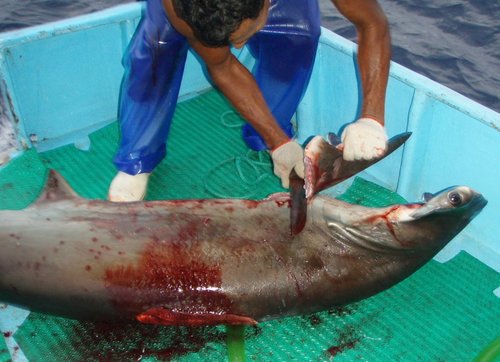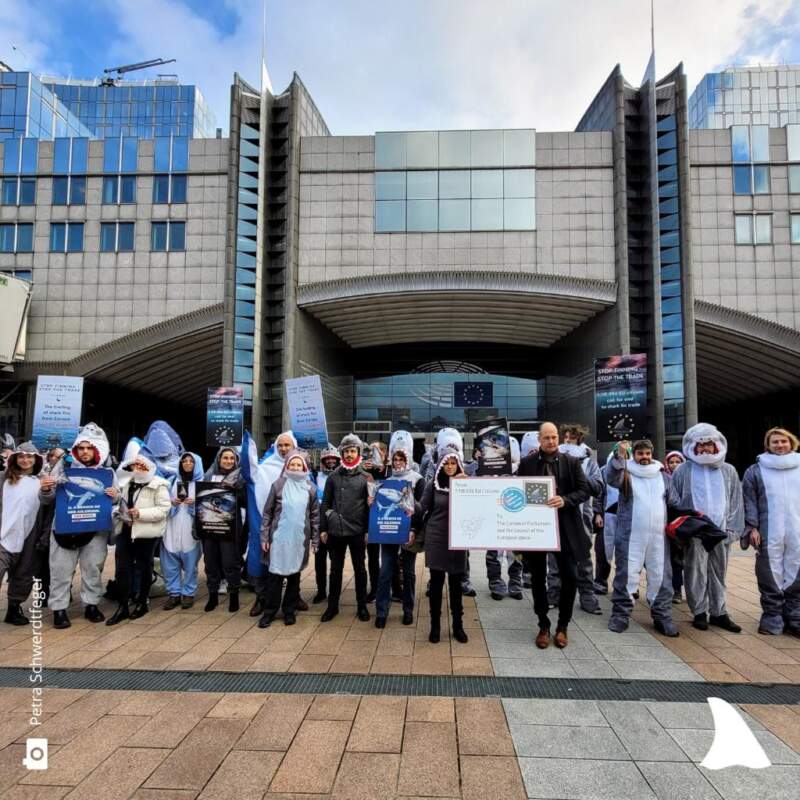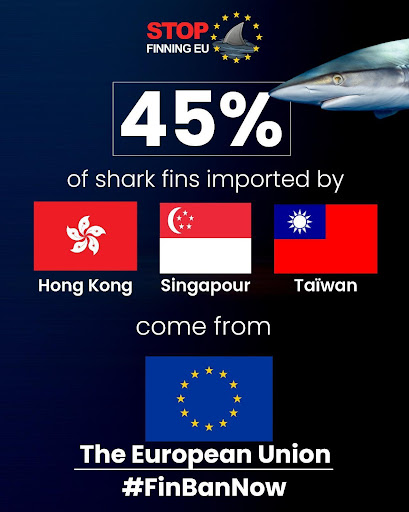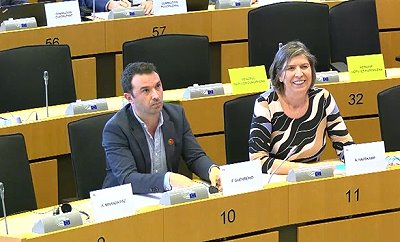 Did you know that sharks are killed worldwide in millions especially for their fins? Europe contributes a shocking 45% to the shark fin trade to Asian markets, both as a main exporter and as a trading hub for shark fins. But this is about to change. The EU Citizens Initiative @StopFinningEU collected over 1.1 million statements to support the establishment of a trade ban on shark fins in Europe! Now Europe has the chance to prove that they are taking their conservation obligations seriously.
Did you know that sharks are killed worldwide in millions especially for their fins? Europe contributes a shocking 45% to the shark fin trade to Asian markets, both as a main exporter and as a trading hub for shark fins. But this is about to change. The EU Citizens Initiative @StopFinningEU collected over 1.1 million statements to support the establishment of a trade ban on shark fins in Europe! Now Europe has the chance to prove that they are taking their conservation obligations seriously.
The European Parliament held a much noticed hearing on the matter on 27 March 2023.
Mundus maris has supported the campaign that led to more than a million European citizens in 15 countries to plead for a stop to the cruel practice of shark finning. It’s in particular to stop the trade so that the perverse economic incentive for cutting off the shark fins, sometimes even from live animals is eliminated in Europe for good. Representaties of the EU Petitions Committee and others, including Virginijus Sinkevičius, member of the European Commission for Environment, Oceans and Fisheries, recognized the huge public support gathered even under the constraints of the pandemic, one of only few such successful initiatives.
Nils Kluger, Campaign leader, had gathered a team of international experts to provide evidence for the case. He underlined that while finning is already legally prohibited in Europe since 2013, the systematic killing of sharks has increased because of the high prices for sharkfins in the face of continued strong market demand in Asian countries where finning is not outlawed. First of the expert team to speak was famous marine scientist Dr. Sylvia Earle. She was the first female chief scientist of the U.S. National Oceanic and Atmospheric Administration (NOAA). Sylvia Earle reported results of decades of research on how important sharks are for healthy marine ecosystems. Sharks are highly intelligent beings. They can feel pain and have many cognitive skills that could be envied by humans.
A few days before the hearing a small band of supporters had already gathred in front of the European Parliament building in Brussels to draw attention of the elected members and their assistants to the forthcoming hearing.

During the hearing, other experts gave witness about the extreme weakness of the inspection system, a major reason why the existing legislation was ineffective on the ground. In particular, Mr. Bradley Soule, Fisheries Enforcement and Complience Consultant, explained his first hand experience with the impossibility of understaffed customs and port inspection services to identify the shark species from just looking at a wild mix of fins in large consignments or even containers, which would even be challenging for shark experts. He said that years of efforts at training of officers had not showed results because it was simply impossible for the officer to confidently check large batches. Genetic profiling was also too expensive and cumbersome. Moreover, officers had to act by prioritising risks, which meant they often gave precedence to searching arms and drugs.
 To illustrate the case further, he cited the huge discrepancy between customs declarations of containers for export from Europe which concealed much of the contents and the more realistic import declarations of these same containers in Asian countries not banning shark finning. He also showed several fins around and challenged anybody in the room to tell whether these were from threatened species listed in Annex II of the CITES Convention on Trade in Endangered Species and thus requiring species permits or, in general, whether they were legitimate products or not.
To illustrate the case further, he cited the huge discrepancy between customs declarations of containers for export from Europe which concealed much of the contents and the more realistic import declarations of these same containers in Asian countries not banning shark finning. He also showed several fins around and challenged anybody in the room to tell whether these were from threatened species listed in Annex II of the CITES Convention on Trade in Endangered Species and thus requiring species permits or, in general, whether they were legitimate products or not.
Mr. Daniel Voces de Onaindi, the representative of the industrial lobby group EUROPECHE, depicted a rosy scenario of perfect compliance with all rules, a legitimate trade and shark meat consumption particularly in and out of Spain. He was seconded by Ms. A. Miranda Paz, MEP from Vigo, the principal fishing port city in Galicia, Spain. Ms. Miranda Paz insisted that the globally operating Galician surface longlining fleet was working to the highest standards and in full transparency. It did not practice finning and caught and landed only whole fish for domestic consumption and export, particularly blue shark (Prionace glauca). As a result of the dramatic decline in shortfin Mako sharks (Isurus oxyrinchus) the fleet had voluntarily stopped fishing. Mako sharks reproduce very slowly and attain 70 years or more in nature.
Mr. Alex Cornelissen, an expert in maritime surveillance in West Africa, begged to disagree. He pointed to several examples of illicit practices by Spanish vessels. One concerned a vessel from Vigo with a licence for tuna fishing in Liberia which upon inspection was found catching sharks for oil and fins. It was not to generalise to the entire fleet, but showed the difficulty to ensure compliance in the face of perverse incentives. He observed that in the last years more and more juvenile sharks being caught as the adult populations were already severely depleted. That needed to stop immediately to allow populations to recover, if still possible.
Mr. Soule added that with the prevailing complex international supply and value chains traceability was compromised despite efforts in the EU. To assume that traceability could be ensured in container loads of detached fins from diverse species was simply completely unrealistic.

MEPs A. Hazekamp, NL (to the right) and F. Guerreiro, PT, who both took the floor during the hearing
Several MEPs took the floor asking not to listen to the industrial fishing lobby but to stop the barbaric practice of finning. They asked to listen to the citizen initiative for a stop to shark fin trade as this would eliminate the incentives to play foul while also protect legitimate small-scale fishers. They also demanded greater efforts to generate reliable data.
The representative of the Social and Economic Committee took the floor underscoring his support for the citizen initiative. He explained that for him it was not even a matter of producing more data per se as he had seen for himself in 40 years diving in many different places the dramatic decline of sharks.
The Commission representatives said they would seriously examine the demands and the evidence during the review process. By July 11, 2023 the Commission is expected to take a decision on how to proceed in this matter.
In his closing remarks Mr. Kluger expressed his satisfaction with the good dialogue, the important questions and passionate speeches. He thanked all MEPs and representatives of the Commission and various committees for active engagement in the hearing. He thanked particularly the more than 1.1 million EU citizens who signed the demand for the end of shark finning through a trade ban for fins. After the UK, Canada and the US it is finally time for the European Union to follow the good example and take the necessary stops to save sharks!
If you missed the hearing, you can still watch the recorded webstream here.
An analysis of claims made by Europeche is accessible here.
